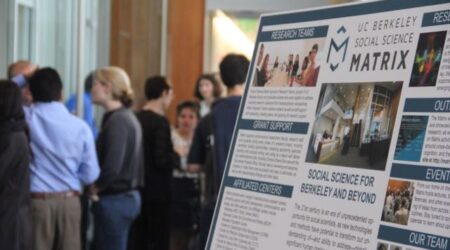 From the start of her academic career, Dr. Charis Thompson, Chancellor’s Professor and Chair of the Department of Gender and Women’s Studies, has been deeply interested in using the qualitative social sciences to explore the role of science in society. As an undergraduate at Oxford University, she was the first woman member of the Artificial Intelligence Society, and she studied a trio of disciplines: psychology, physiology, and philosophy. She has authored books on assisted reproductive technologies and on stem cell research (Making Parents and Good Science, both from MIT Press). Her academic home in UC Berkeley’s Gender and Women’s Studies department has given her a unique lens through which to consider the recent American political landscape; in October 2016, she wrote the article “Three lessons in gender and sexuality in this election” for the Berkeley Blog, in which she asked, “What can we learn from the fact that the scenography of this election has included explicit sexual predation at every turn?” In answering this question, Dr. Thompson argued against the urge to see sexual harassment and vulgarity as distractions from “real issues.”
From the start of her academic career, Dr. Charis Thompson, Chancellor’s Professor and Chair of the Department of Gender and Women’s Studies, has been deeply interested in using the qualitative social sciences to explore the role of science in society. As an undergraduate at Oxford University, she was the first woman member of the Artificial Intelligence Society, and she studied a trio of disciplines: psychology, physiology, and philosophy. She has authored books on assisted reproductive technologies and on stem cell research (Making Parents and Good Science, both from MIT Press). Her academic home in UC Berkeley’s Gender and Women’s Studies department has given her a unique lens through which to consider the recent American political landscape; in October 2016, she wrote the article “Three lessons in gender and sexuality in this election” for the Berkeley Blog, in which she asked, “What can we learn from the fact that the scenography of this election has included explicit sexual predation at every turn?” In answering this question, Dr. Thompson argued against the urge to see sexual harassment and vulgarity as distractions from “real issues.”
Early this year, Professor Thompson presented at the World Economic Forum in Davos. One of her talks, part of the Forum’s IdeaLabs program, addressed the subject “Cultivating appropriate emotions in a time of nationalist populism,” which questioned the popularization of emotions like mindfulness, gratitude, and awe without accompanying introspection on sources of societal inequality.
We sat down with Professor Thompson to discuss the themes of her election article and Davos talk, and to hear her thoughts on the highly publicized Women’s March and March for Science events. [This interview was edited for length and content.]
Matrix: Last fall, in writing about the election, you wrote, “Social media have become another means by which power reproduces and is in turn reproduced by racism, classism, sexism, ableism, and citizenship status. Little has been done to combat these patterns; on the contrary, we have evidence that algorithms and social media tend to amplify rather than correct for structural bias and discrimination. Our campus’s research on the age of social media is urgent.” Can you expand on this?
Charis Thompson: Many researchers have shown that social media can be used to troll others, isolate people in their so-called “bubbles” or echo chambers, and create places for absence of accountability, places to collect voices of hate, repercussion-free environments, and create anxiety and FOMO [fear of missing out], going all the way up to suicidal ideation. There’s also a growing body of work on the non-neutrality of algorithms, like [Cathy O’Neil’s] Weapons of Math Destruction, which you showcased at Matrix.
Matrix: In your work on science and society, have you ever encountered challenges with people in STEM not regarding social issues and social science as “serious?” Has there been change in that area?
Thompson: I do a considerable amount of work with, and think very highly of, my STEM colleagues. But I think everyone has a bit of disciplinary chauvinism, this “we do this a little better than everyone else” idea. Everyone’s got their hierarchy of “hardness.” There are a few areas where these views are more society-wide, and that’s more problematic. In America, we tend to conceptualize mathematics as intrinsically “hard”, so that somehow if you’re not good at it when you’re a teenager, there are a bunch of things you can never do in this country. However, evidence suggests that it isn’t all over when you’re a teenager. Plenty of people aren’t interested in knowing what “X” is when they’re thirteen, but they really would be, especially if it was connected to a really interesting job, when they’re 23. So there are some places where we need to de-naturalize hierarchies of hardness that have settled a bit too much.
The little bit of disciplinary chauvinism that all disciplines have is fine. There’s a pleasure in one’s disciplinary apparatus and one’s disciplinary expertise that shouldn’t be taken away. I never expect a random STEM person to be remotely interested in or attentive to what I’m doing, but I find that when they are, they’re extremely open to what I and my colleagues are doing. And I try to be extremely open to what they’re doing. I go to labs quite a bit. I’m not interested in making my work either “more” or “less” than theirs, or more in service to theirs or theirs in service to mine. If you’re knowledgeable about each other’s work, what you work on and what you’re good at can get better at helping with the problem at hand.
Matrix: What were your thoughts on the recent March for Science?
Thompson: We’ve enjoyed an era in the postwar period in America where the sciences have been very tightly related to governance—until Trump’s presidency and this recent era. For all that I’m excited to march for truth, evidence, and expertise, I also interpret the “March for Science” as protesting a little bit much. We’ve never been in a better era for science and technology than we are today, and Trump’s election has not changed that. What has changed is that tight relation between governance and science.
At the same time that science stands up for scientific evidence and facts, [the field] would do well to acknowledge straightforwardly that it has been complicit in scientific racism, scientific sexism, and homophobia, and in rendering some of its subfields as ones that have a racial and gendered order.
The disciplines I see under the most suppression and repression are Gender Studies, Sexuality Studies, African-American Studies, Ethnic Studies, and Indigenous Studies. They are being de-legitimated from multiple sources, rendered as if they are not composed of expertise and facts, but as if they’re just opinion or political correctness. People who use their knowledge and expertise to point out sexism, racism, etc., are being silenced with claims of free speech that are ultimately attributed to individual rights or to the Constitution. This is profoundly problematic and is the real assault in our moment on expertise and evidence.
I understand the critique of knowledge and expertise in the context of globalization and the idea that “everyday people need to have our cultures and jobs and make a living and be heard.” I also get the critique of political correctness or limits to free speech that is against moral censoring of what other people say and moral centering of what you yourself say: “I know more than you about race, gender, class, sexuality, etc., so you and people like you are racist or sexist or…” The first part of that is probably true when race, class, gender etc. scholars are speaking, but the second part can be what people hear. But the second part doesn’t necessarily follow from the first part, and when it does follow, it indicates a shared social problem, not a hierarchy of political virtue. I think that you need to call people in, not call them out, though those terms can be tricky, too.
But the idea that you can say what you want about race, gender, class, disability, and so forth, that it’s just opinion and there’s no knowledge or expertise [in these fields], so experts have no right to correct you and no right to refuse to treat you like a scholar at a university where we’re supposed to traffic in knowledge—that feels to me like where we should have the real science march: around the obliteration of recognition of expertise in these fields.
The disciplines I see under the most suppression and repression are Gender Studies, Sexuality Studies, African-American Studies, Ethnic Studies, and Indigenous Studies. They are being de-legitimated from multiple sources, rendered as if they are not composed of expertise and facts, but as if they’re just opinion or political correctness.
Matrix: What were your thoughts on another march, the Women’s March? Given your extensive work on reproductive technologies and gender, I’m also curious to hear your opinion on the debate the march sparked over whether it is possible to be a “pro-life feminist”.
Thompson: I went to the Women’s March with three generations of my family. Like the Science March, it was moving and wonderful and exciting, and it did a better job than the Science March, even though it was still problematic at airing some of the problems with some of the women’s movement, its whiteness and middle-classness. In this department, we approach everything from an intersectional and transnational point of view. If something is about white and middle-class women in the U.S., we say that, as opposed to assuming that [as a default]. We try to be geographically and historically specific, and we try to see the salient axes of power—racializations, or ethnicizations, or religion or colonialism—that operate in the time and the place you’re talking about. I think these conversations were a crucial part of the Women’s March. They didn’t get it perfect, but that’s consonant with the history of American feminism.
On the subject of reproductive rights, I’m relatively pro-life. Politically, I am pro-choice. I don’t like it when people favor a fetus over a living woman, as if the fetus is innocent and that makes them a better citizen than the “sullied woman”. You’ve got to keep abortion available. It has to be a woman’s choice and it has to be free and accessible. But all other things being equal, I’m not a big fan of abortion. All this to say yes, I think you can be pro-life and be feminist. I find it much easier to be pro-life and feminist than to be filthy rich and feminist, in the sense that you get a Lean In book or you get Ivanka Trump telling you what to do with your staff. I find it much harder for those positions to seem feminist to me than for a pro-life position to seem feminist to me.
Matrix: In your Davos talk, you made a provocative argument in saying that we need to question how we throw around emotions like awe, mindfulness, and gratitude willy-nilly, without questioning the social inequalities that might enable those emotions. What motivated you to discuss this subject?
Thompson: At [the World Economic Forum’s] IdeaLabs, the university and the Davos Secretariat decide on a theme that would cut across the people they’re inviting. The theme they gave to Berkeley this year was the Science of Emotions. Because I’m writing this book on science and technology elites at the moment, I had been very interested in the way that inequality is processed affectively. I’m very interested in stratification and the geographies and histories that layer upon each other and cause stratification over time. That’s how I see a place.
We’re in an era where emotions, or pathos from the classical rhetorical tradition, and logos [reason], have kind of come apart. A lot of what is being said is being done by pathos, by appeals to emotion. This is very important politically at the moment. And I really want us to come back to a time when ethos [appeal to ethics, character of a group] mattered, when the things that are historically, normatively, and experientially rich are shared. I want us to get that back. And that’s not a time we live in.
In the particular case of the technology elites, who you could say represent the experts who have been voted against in the rise of populism, I really disliked the way that the structural difference is wiped out [with emotions]. So you become “grateful” rather than being “grateful for something.” You “give back,” but you’re giving back what you took; you just cut out the “took.” Or “We’re grateful for being richer than you”. There, you’re again taking out the uncomfortable term. In that, the relationality is lost, the fact that these emotions play out very differently for different people. Celebrating them without the uncomfortable term launders your privilege instead of questioning it. That was what was problematic to me, and I did want to point to that [at Davos] because of the “happiness industry” that people often talk about.
Matrix: You bring an academic perspective that often leans toward critique. Do you ever find yourself at odds with the “technology can solve all the problems” attitude that is pervasive in Silicon Valley?
Thompson: I have a combination of three attitudes: I have an eye-rolling reaction to the ‘let’s just fix it,’ technophilic, technical-solution-to-all-the-problems attitude. At the same time, I am a real technophile; I love technology, and I love thinking of possible solutions, including entrepreneurial ones. There are a lot of very interesting movements between public and private at the moment, and I’m certainly not ideologically opposed to everything in the private sector.
But it is essential, even in an innovation economy, to keep alive the importance of critique. It’s true in the qualitative social sciences that our work tends to focus more on the historical and critical. That’s essential because in order to do things better, to understand the fundamental nature of historical and material contingencies, hierarchies, and social organizations, you need to be able to imagine that it could be other than how it is. Sometimes what’s needed is just tweaking. Sometimes what’s needed is more fundamental change. For that, you need to understand how things came to be as they are, how they might be otherwise, and what different elements are competing to make people experience major social problems. But I am very interested in responding on the positive side to major social problems, too. It’s not enough to just say “inequality is bad.” I’m interested in solutions.
Top Image Credit: Becker1999 via Wikimedia Commons, Creative Commons 2.0 Generic License.



